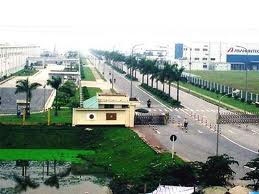IZ development gathers steam
 |
Investment in these zones has dropped in the last two years and industry specialists have attributed the fall to the global economic recession and changes in state policies.
Under Decree 124/2008/ND-CP dated December 11, 2008 and effective from January 1, 2009 guiding the implementation of corporate income tax (CIT) law, businesses in industrial zones (IZ) and export processing zones (EPZ) no longer benefit from CIT incentives.
Similarly under the Decree 69/2009/ND-CP effective from August 13, 2009 containing supplemental regulations on land use planning, land price, compensation and resettlement, IZ and EPZ enterprises have to suffer from higher site clearance costs.
Deputy minister of Planning and Investment (MPI) Dang Huy Dong said these regulations had had big impacts on attracting investors to IZs and EPZs.
“Investment authorities are asking the Ministry of Finance to revise such tax laws to ensure tax incentives for IZ and EPZ businesses as before 2009,” he said.
He said the efforts were also for the Ministry of Natural Resources and Environment to adjust existing site clearance and compensation cost regulations to make them compliant with practices.
Investment incentives are not the only issue affecting IZs and EPZs’ performance. Authorities at many IZs are unsatisfied about unclear regulations on their functions, tasks and power though all these were regulated in the Governmental Decree 29/2008/ND-CP dated March 14, 2008.
The head of MPI’s Economic Zones Management Division Le Tan Cuong said decentralisation for management authorities at IZs and EPZs was inconsistent in locations across the country.
“In some locations, management authorities [at IZs and EPZs] have full management functions across diverse economic sectors, while in some other places their management functions are only limited to some specific areas,” he said.
“Under the governmental Decree 29, management authorities have the right to grant business certificates to EPZ’s businesses. However, due to the lack of a guiding decree we cannot handle the function,” said a Chu Lai Open Economic Zone Authority representative.
Dong said IZ and EPZ management authorities had to be further empowered and decentralised to enjoy full functions and power as regulated in the Decree 29.
About the Decree 29, Cuong said the birth of the decree was timely in building a system of legal documents to oversee IZs, EPZs and economic zone (EZ) development.
However, he acknowledged the decree needed further amendments to fit current development requirements.
“In the coming period, the MPI will summarise comments from relevant state agencies and localities and propose amendments to the Decree 29 in the direction of further decentralising and empowering management authorities at IZs, EPZs and EZs, particularly in inspection and punishment of administrative, labour and environmental violations,” he said.
Vietnam is currently home to 250 IZs, EPZs and EZs with a total registered capital of around $70 billion, attracting $52 billion worth of FDI, or 30 per cent of the country’s total FDI amount.
They currently contribute over 30 per cent of Vietnam’s total industrial production value and create jobs for more than 1.5 million people.
What the stars mean:
★ Poor ★ ★ Promising ★★★ Good ★★★★ Very good ★★★★★ Exceptional
Related Contents
Latest News
More News
- Hermes joins Long Thanh cargo terminal development (February 04, 2026 | 15:59)
- SCG enhances production and distribution in Vietnam (February 04, 2026 | 08:00)
- UNIVACCO strengthens Asia expansion with Vietnam facility (February 03, 2026 | 08:00)
- Cai Mep Ha Port project wins approval with $1.95bn investment (February 02, 2026 | 16:17)
- Repositioning Vietnam in Asia’s manufacturing race (February 02, 2026 | 16:00)
- Manufacturing growth remains solid in early 2026 (February 02, 2026 | 15:28)
- Navigating venture capital trends across the continent (February 02, 2026 | 14:00)
- Motivations to achieve high growth (February 02, 2026 | 11:00)
- Capacity and regulations among British areas of expertise in IFCs (February 02, 2026 | 09:09)
- Transition underway in German investment across Vietnam (February 02, 2026 | 08:00)

 Tag:
Tag:




















 Mobile Version
Mobile Version